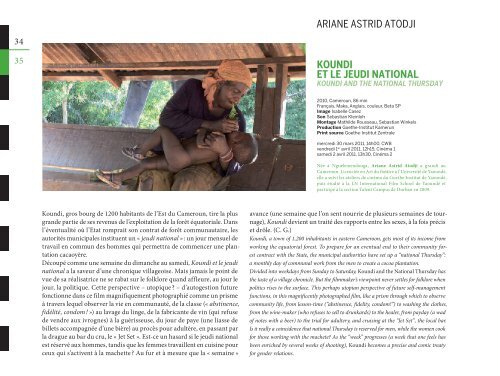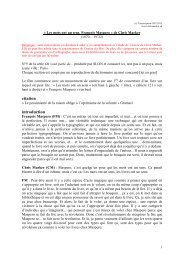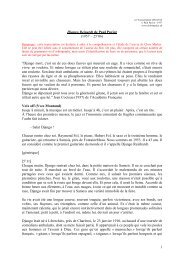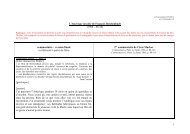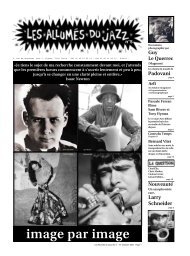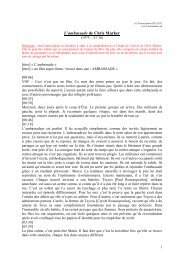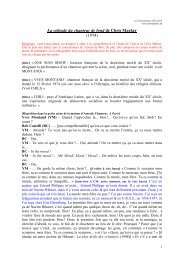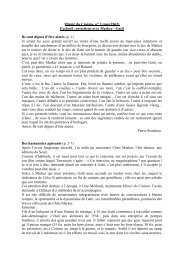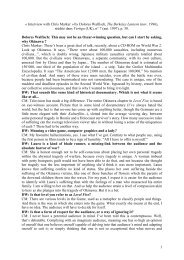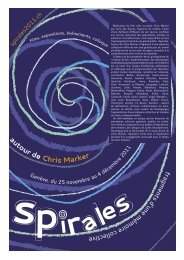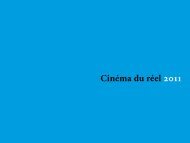3435Ariane Astrid AtodjiKoundiet le jeudi nationalKoundi and the National Thursday2010, Cameroun, 86 minFrançais, Maka, Anglais, couleur, Beta SPImage Isabelle CasezSon Sebastian KleinlohMontage Mathilde Rousseau, Sebastian WinkelsPro<strong>du</strong>ction Goethe-Institut KamerunPrint source Goethe-Institut Zentralemercredi 30 mars <strong>2011</strong>, 14h00, CWBvendredi 1 er avril <strong>2011</strong>, 12h15, Cinéma 1samedi 2 avril <strong>2011</strong>, 13h30, Cinéma 2Née à Nguelemendouga, Ariane Astrid Atodji a grandi auCameroun. Licenciée en Art <strong>du</strong> théâtre à l’Université de Yaoundé,elle a suivi les ateliers de cinéma <strong>du</strong> Goethe Institut de Yaoundé,puis étudié à la LN International Film School de Yaoundé etparticipé à la section Talent Campus de Durban en 2009.Koundi, gros bourg de 1200 habitants de l’Est <strong>du</strong> Cameroun, tire la plusgrande partie de ses revenus de l’exploitation de la forêt équatoriale. Dansl’éventualité où l’Etat romprait son contrat de forêt communautaire, lesautorités municipales instituent un « jeudi national » : un jour mensuel detravail en commun des hommes qui permettra de commencer une plantationcacaoyère.Découpé comme une semaine <strong>du</strong> dimanche au samedi, Koundi et le jeudinational a la saveur d’une chronique villageoise. Mais jamais le point devue de sa réalisatrice ne se rabat sur le folklore quand affleure, au jour lejour, la politique. Cette perspective – utopique ? – d’autogestion futurefonctionne dans ce film magnifiquement photographié comme un prismeà travers lequel observer la vie en communauté, de la classe (« abstinence,fidélité, condom ! ») au lavage <strong>du</strong> linge, de la fabricante de vin (qui refusede vendre aux ivrognes) à la guérisseuse, <strong>du</strong> jour de paye (une liasse debillets accompagnée d’une bière) au procès pour a<strong>du</strong>ltère, en passant parla drague au bar <strong>du</strong> cru, le « Jet Set ». Est-ce un hasard si le jeudi nationalest réservé aux hommes, tandis que les femmes travaillent en cuisine pourceux qui s’activent à la machette ? Au fur et à mesure que la « semaine »avance (une semaine que l’on sent nourrie de plusieurs semaines de tournage),Koundi devient un traité des rapports entre les sexes, à la fois préciset drôle. (C. G.)Koundi, a town of 1,200 inhabitants in eastern Cameroon, gets most of its income fromworking the equatorial forest. To prepare for an eventual end to their community forestcontract with the State, the municipal authorities have set up a “national Thursday”:a monthly day of communal work from the men to create a cocoa plantation.Divided into weekdays from Sunday to Saturday, Koundi and the National Thursday hasthe taste of a village chronicle. But the filmmaker’s viewpoint never settles for folklore whenpolitics rises to the surface. This perhaps utopian perspective of future self-managementfunctions, in this magnificently photographed film, like a prism through which to observecommunity life, from lesson-time (“abstinence, fidelity, condom!”) to washing the clothes,from the wine-maker (who refuses to sell to drunkards) to the healer, from payday (a wadof notes with a beer) to the trial for a<strong>du</strong>ltery, and cruising at the “Jet Set”, the local bar.Is it really a coincidence that national Thursday is reserved for men, while the women cookfor those working with the machete? As the “week” progresses (a week that one feels hasbeen enriched by several weeks of shooting), Koundi becomes a precise and comic treatyfor gender relations.
Filipa ReisJoão Miller GuerraNuno BaptistaLi Ké Terra2010, Portugal, 65 minPortugais, couleur, DigiBetaImage João Pedro PlácidoSon Ruben CostaPro<strong>du</strong>ction Vende-se Filmes, Pedro&BrankoDistribution, Print source Vende-se Filmesvendredi 25 mars <strong>2011</strong>, 16h15, Cinéma 1samedi 26 mars <strong>2011</strong>, 18h15, Petite sallejeudi 31 mars <strong>2011</strong>, 13h15, Petite salleCompétition InternationalePremiers FilmsNée à Lisbonne en 1977, Filipa Reis réalise en 2008 Dicas no Vinilavec le rappeur Sam the Kid. Né à Lisbonne en 1974, João MillerGuerra étudie et travaille dans le secteur <strong>du</strong> design, pour la télévisionet la presse, puis se lance dans la pro<strong>du</strong>ction. Li Ké Terra est son premierdocumentaire. Né à Lisbonne en 1979, Nuno Baptista travaillecomme monteur pour la télévision et le cinéma. Il a réalisé plusieurscourts métrages expérimentaux et de fiction. Li Ké Terra est son premierlong-métrage documentaire. Le film a remporté le Prix <strong>du</strong> Meilleurdocumentaire portugais au festival Doclisboa 2010.Miguel Moreira et Ruben Furtado, nés au Portugal d’immigrés capverdiens,arrivent au seuil de l’âge a<strong>du</strong>lte. Comment se construire quand l’avenir resteen suspens, bloqué par l’attente de papiers ?A mesure qu’ils expliquent leur situation aux employés préfectoraux, c’estun passé social et familial déjà lourd qui transparaît. A une question surson lieu de naissance, Ruben répond « au Cap-Vert » avant de se reprendre :« Non, à Lisbonne ! ». Son lapsus fait prendre la mesure <strong>du</strong> trouble que cestatut absurde peut causer dans la psyché en formation des adolescents. Ceflou identitaire, Li ké terra (« c’est notre terre », en capverdien) en perçoitles multiples ricochets jusqu’à l’événement quotidien le plus ténu. Les deuxgarçons se comportent on ne peut plus différemment dans cette situationd’attente. Autant Ruben s’impose de ne rien faire (légalement, un emploi luiest interdit), autant Miguel a horreur <strong>du</strong> vide. Rap, cinéma, bachotage pourson examen d’histoire de l’art ; suractif, il sait bien ce qu’il ferait s’il avait despapiers : « J’achèterais un pays ».La qualité d’écoute des réalisateurs, qui ont entamé le projet comme un travailde quartier, perçoit malgré tout chez ces deux amis dissemblables unemême tchatche salutaire : que ce soit pour déterminer l’inexistence de Dieuou la distinction entre « petite-amie » et « amoureuse », Miguel et Ruben argumententavec une obstination inouïe. En ce monde, trouver l’expression juste,c’est au moins tenir une certitude. (C. G.)Miguel Moreira and Ruben Furtado, born in Portugal of Cape Verdean immigrants, havereached the age of a<strong>du</strong>lthood. But how can you build your life when the future is suspended,blocked by the long wait for regularisation?As they explain their situation to the Prefecture officials, an already heavy social and familypast comes to light. Asked about his place of birth, Ruben replies “in Cape Verde” beforecorrecting himself: “No, in Lisbon!” His Freudian slip shows to what extent this absurdstatus can trouble the developing psyche of an adolescent. Li ké terra (“It’s our land”, inCape Verdean creole) captures the multiple repercussions of this confusing identity, evenin the detail of everyday events. The two boys behave totally differently <strong>du</strong>ring this longwait. While Ruben forces himself into inaction (legally, he is forbidden to work), Miguelis terrified of nothingness. Rap, cinema, swatting for his art history exam; over-active, hewell knows what he’d do if he had his papers: “I’d buy a country”.
- Page 3 and 4: Cinéma du réelremercie toutpartic
- Page 5 and 6: Patrick BazinDirecteur de la BpiBib
- Page 7 and 8: Guy SeligmannPrésident de laScamSo
- Page 9 and 10: Claude LemeslePrésident duConseild
- Page 13 and 14: Autres jurys13Le Jury des jeunes, c
- Page 15 and 16: Compétition internationaleCompéti
- Page 17 and 18: Ruth BeckermannAmerican Passages17C
- Page 19 and 20: Claudio PazienzaExercices de dispar
- Page 21: Lee Anne SchmittThe Last Buffalo Hu
- Page 24: 2425Ariane DoubletLa Pluie et le be
- Page 30: 3031Olga MaurinaDomHome2011, Russie
- Page 33: Bettina BüttnerKinderKids2011, All
- Page 37 and 38: Marco SantarelliScuolaMediaJunior H
- Page 39 and 40: Michele PennettaI Cani abbaianoThe
- Page 41 and 42: juan Manuel SepúlvedaExtraño rumo
- Page 43 and 44: Javier LoarteMe llamoRoberto Delgad
- Page 45 and 46: Vania AillonLa Terre tremble2011, S
- Page 47: Mehdi BenallalAux rêveurstous les
- Page 50 and 51: Matthieu ChatellierDoux amer5051201
- Page 53 and 54: Gaël LépingleJulien2010, France,
- Page 55 and 56: Sophie BruneauMarc-Antoine RoudilMa
- Page 57 and 58: Marie DumoraLa Place2011, France, 1
- Page 60: News From…Patrick KeillerNicolás
- Page 63 and 64: Verena Paravel, J.P. Sniadeckisamed
- Page 65 and 66: 2010, Chine, 356 minMandarin, coule
- Page 67 and 68: Séancesspéciales10. Mythologie ou
- Page 69 and 70: Andrei Ujică,La révolution, live1
- Page 71 and 72: 2010, Roumanie, 180 minRoumain, cou
- Page 73 and 74: 1993, États-Unis /Italie, 55 minHi
- Page 75 and 76: Leo HurwitzAmerica never was Americ
- Page 77 and 78: Leo Hurwitz #1samedi 26 mars 2011,
- Page 79 and 80: Leo Hurwitz #3jeudi 31 mars 2011, 1
- Page 81 and 82: Richard LeacockRichard Leacock aura
- Page 83 and 84: Dédicace Richard Leacocksamedi 2 a
- Page 85 and 86:
Les outils du cinéma documentaire
- Page 87 and 88:
Camera #3 Pierre Lhomme, Renato Ber
- Page 89 and 90:
Dédicaces& Ateliers
- Page 91 and 92:
Le poème documentaireLe 28 octobre
- Page 93 and 94:
Exploring documentary #2 Rudy Burck
- Page 96 and 97:
Exploring documentary # 5 Helga Fan
- Page 98 and 99:
Exploring documentary #7 Leighton P
- Page 100 and 101:
Exploring documentary #9 Odes ciné
- Page 103 and 104:
1994 et 2001, France, 8 minFrançai
- Page 105 and 106:
Thanks for the American dream,To vu
- Page 107 and 108:
1931, États-Unis, 11 minCartons an
- Page 109 and 110:
1935, États-Unis, 6 minCartons ang
- Page 112 and 113:
Réalisateur inconnuProtestExtrait
- Page 116 and 117:
Écoute Voir !Hors scèneAvec le so
- Page 118 and 119:
Hors scène #2jeudi 31 mars 2011, 1
- Page 120:
Hors scène #5samedi 2 avril 2011,
- Page 123 and 124:
Hors scène #10dimanche 3 avril 201
- Page 125 and 126:
Lech Kowalski : Underground Rock St
- Page 127 and 128:
Le cinéma est parfois invisible.Ce
- Page 129 and 130:
Adriano Aprà Historien du cinéma,
- Page 131 and 132:
Était-ce un téléfilm ? Un oubli
- Page 133 and 134:
¹de connaître les films du Hollan
- Page 135 and 136:
Freddy BuacheAncien conservateur de
- Page 137 and 138:
¹Vincent Dieutre CinéasteLe film
- Page 139 and 140:
¹c’était une manière de miracl
- Page 141 and 142:
Mon film et l’entretien ont été
- Page 143 and 144:
¹au paysage urbain de New York, le
- Page 145 and 146:
¹Eric Le Roy Chef du service Accè
- Page 147 and 148:
¹Marcel Lozinski CinéasteA la rec
- Page 149 and 150:
¹surgissent quand on les a cherch
- Page 151 and 152:
¹contenu réaliste, voire ethnogra
- Page 153 and 154:
¹Errere errera…Je suis en voyage
- Page 155 and 156:
¹teur, je suis presque sûr que se
- Page 158 and 159:
158159Peter von Bagh Cinéaste, his
- Page 160 and 161:
Mémoire du réel
- Page 162 and 163:
Les 20 ans du Prix Louis Marcorelle
- Page 164 and 165:
Rencontres et événements
- Page 166 and 167:
Soirée Video et Après / Cinéma d
- Page 168 and 169:
Rencontres et débats168169Rencontr
- Page 170 and 171:
Forum AddocQuand le documentairereg
- Page 172 and 173:
172173Séances hors les mursCENTRE
- Page 174 and 175:
176177Index des réalisateursAAbi S
- Page 176 and 177:
178KGP Kranzelbinder GabrieleProduc
- Page 178:
180181L’ équipe du Cinéma du r


